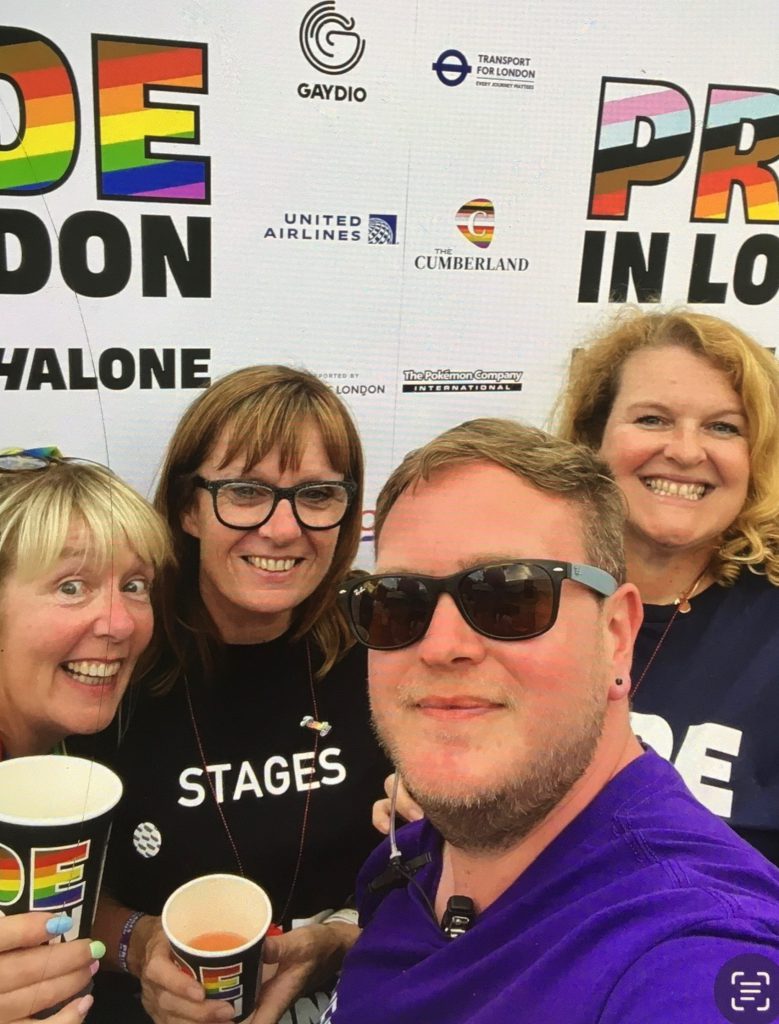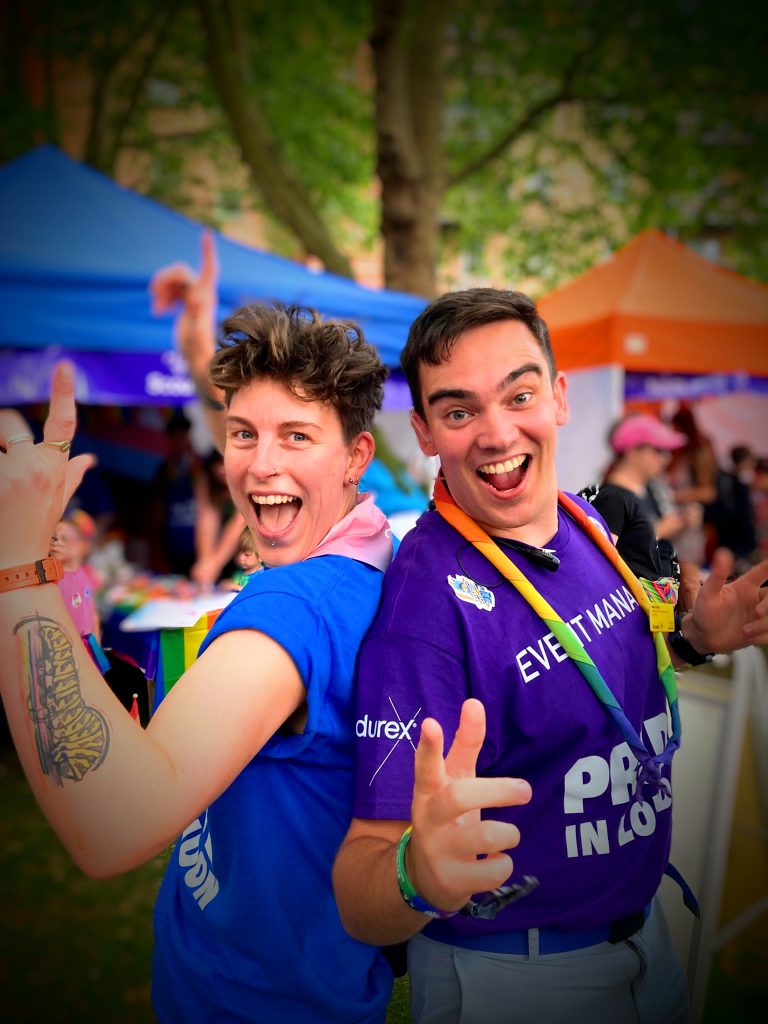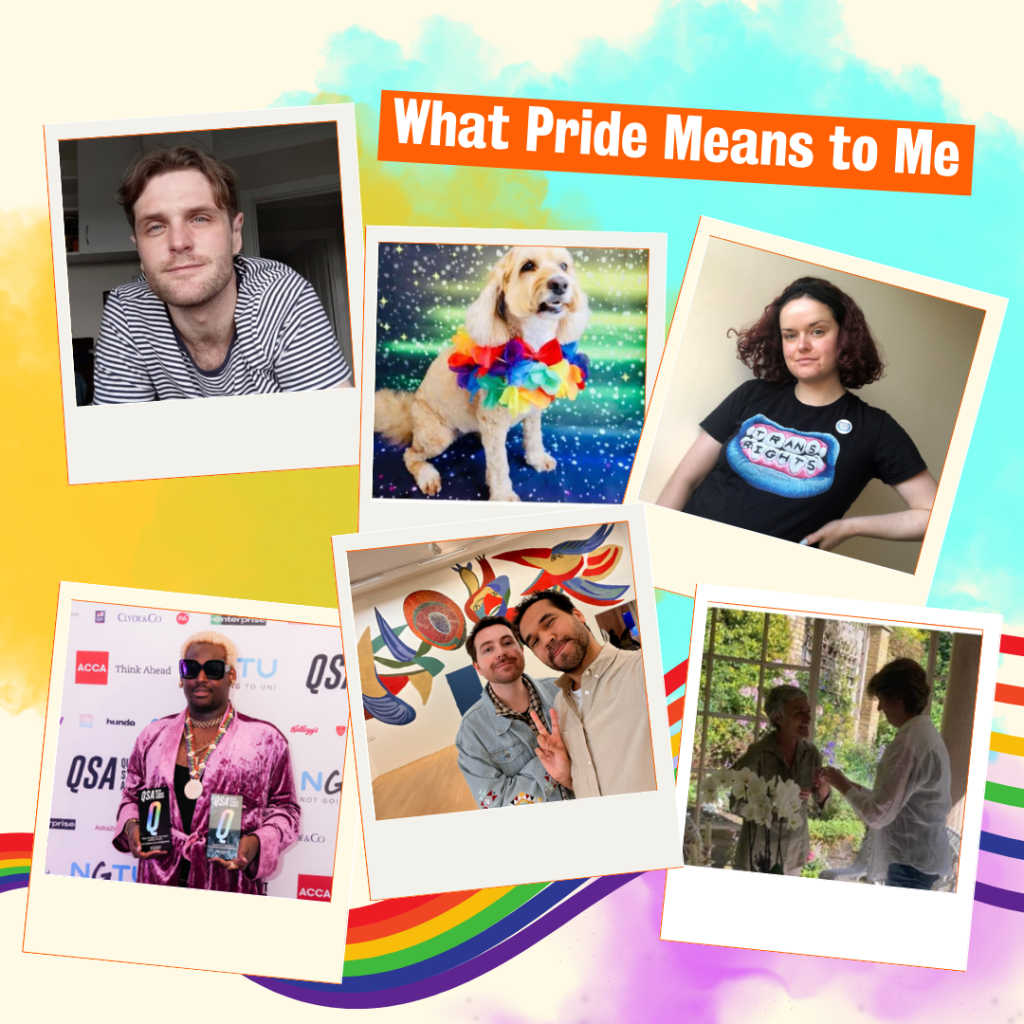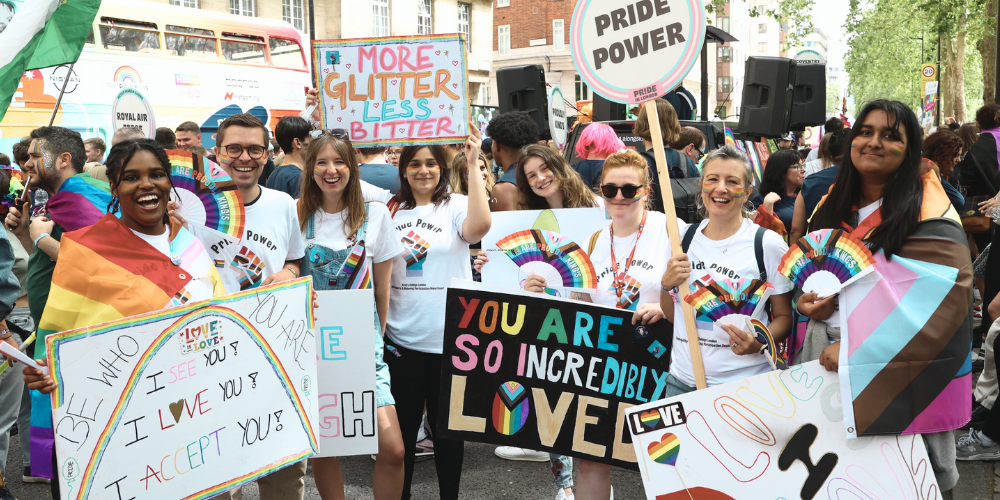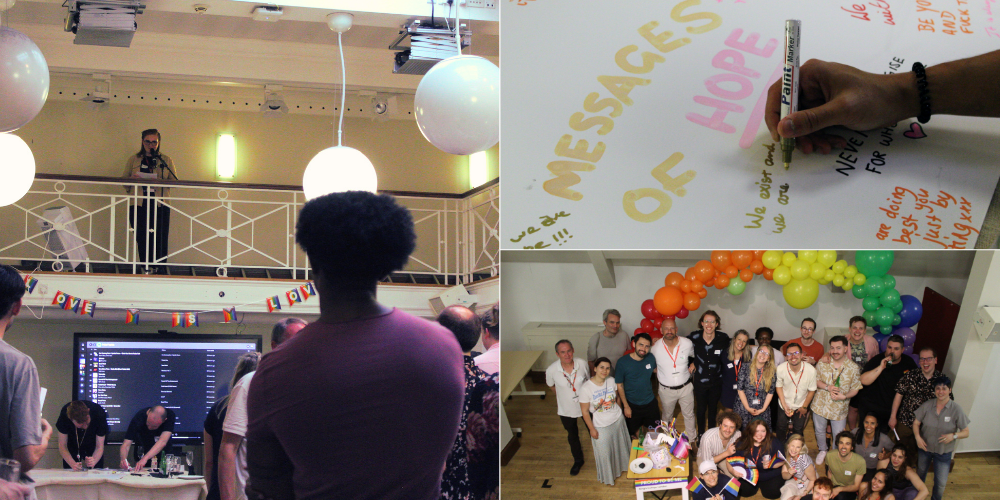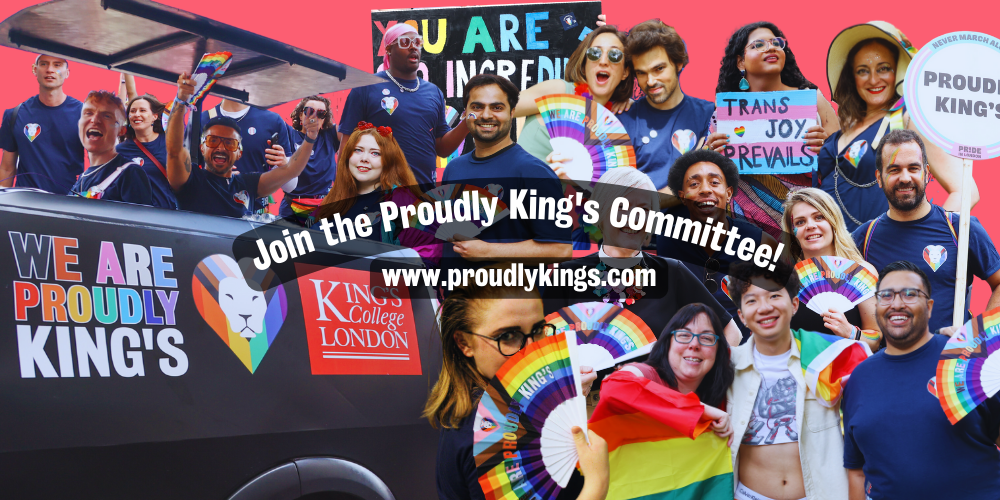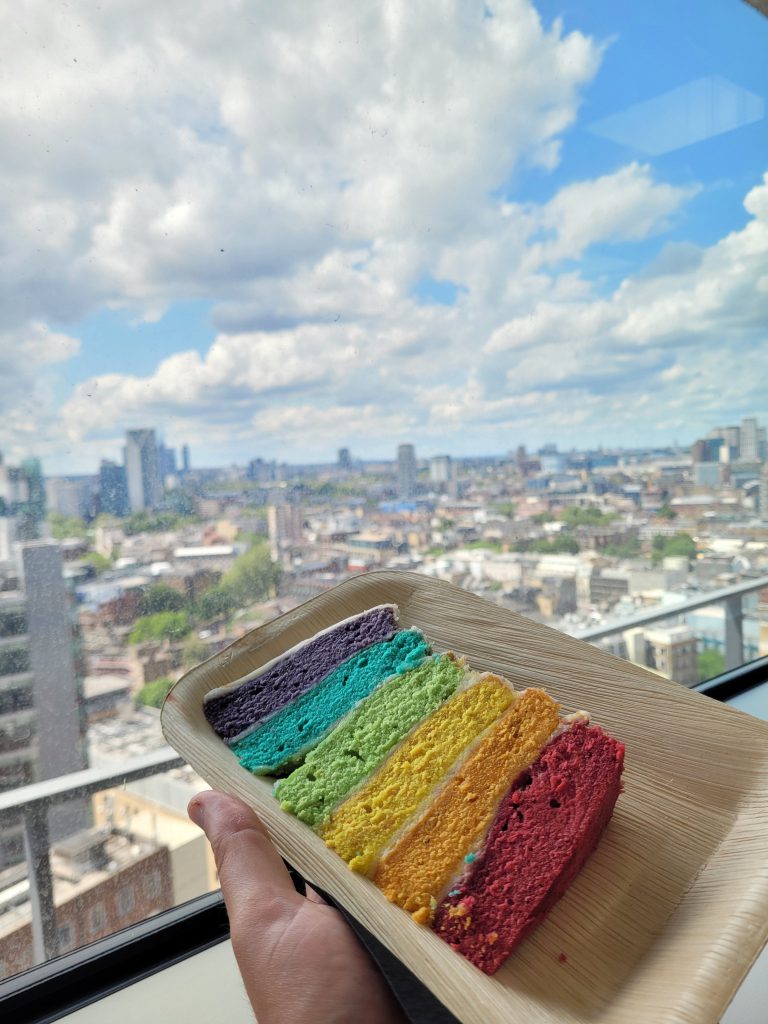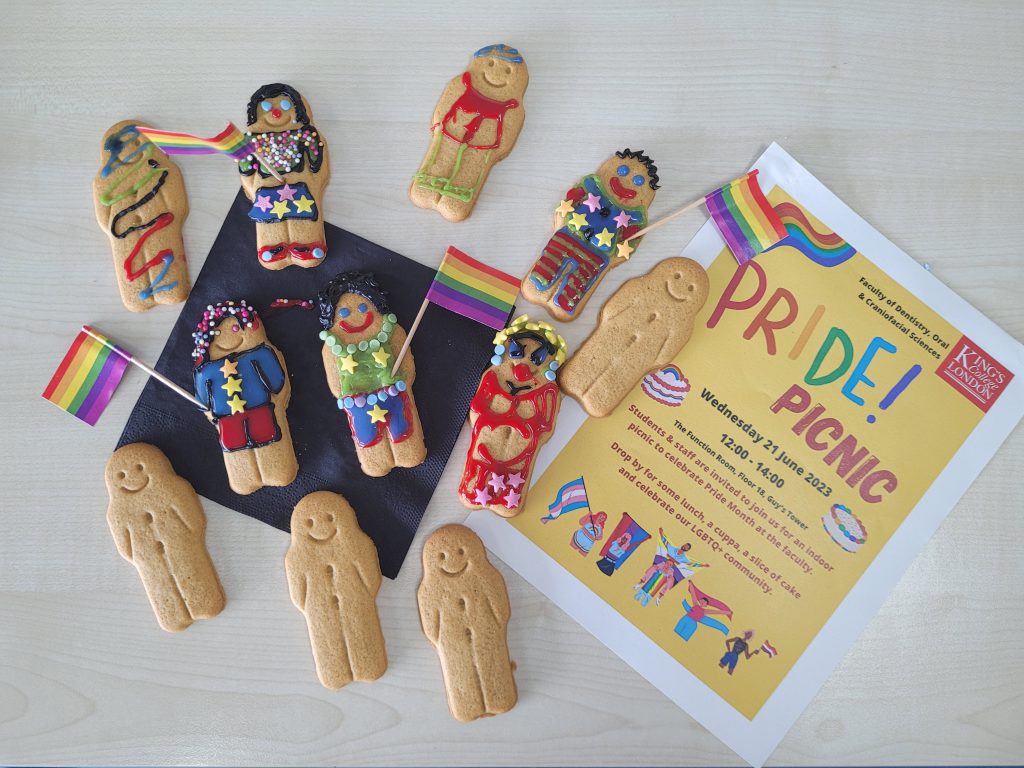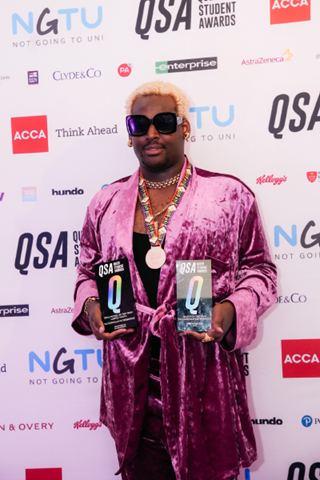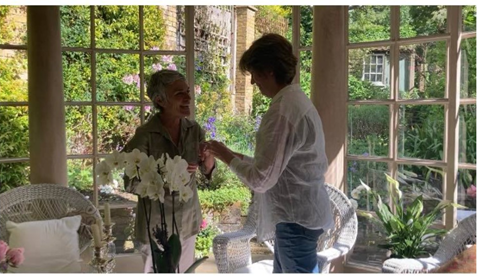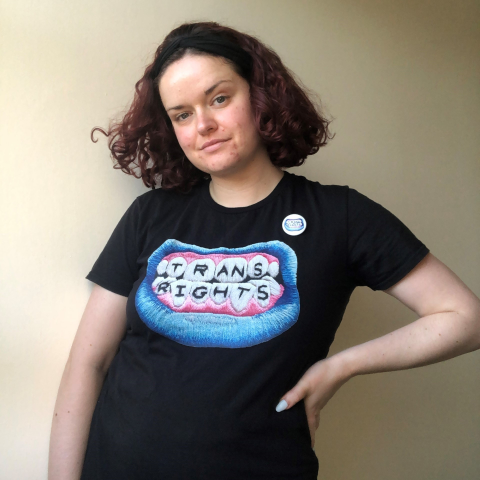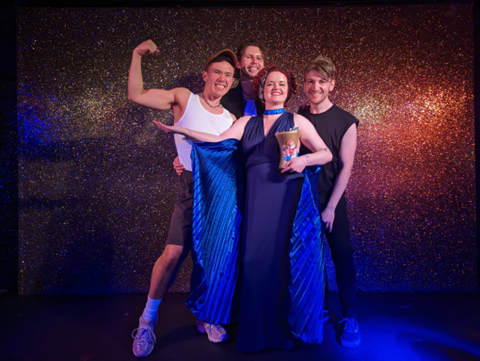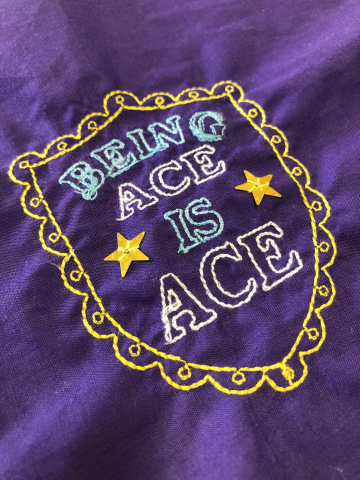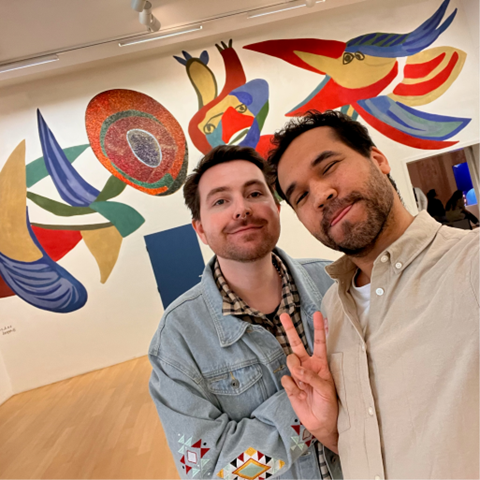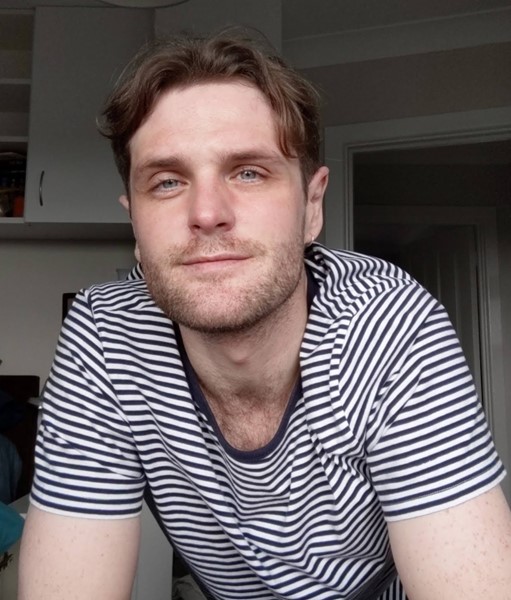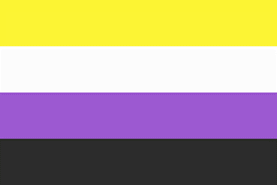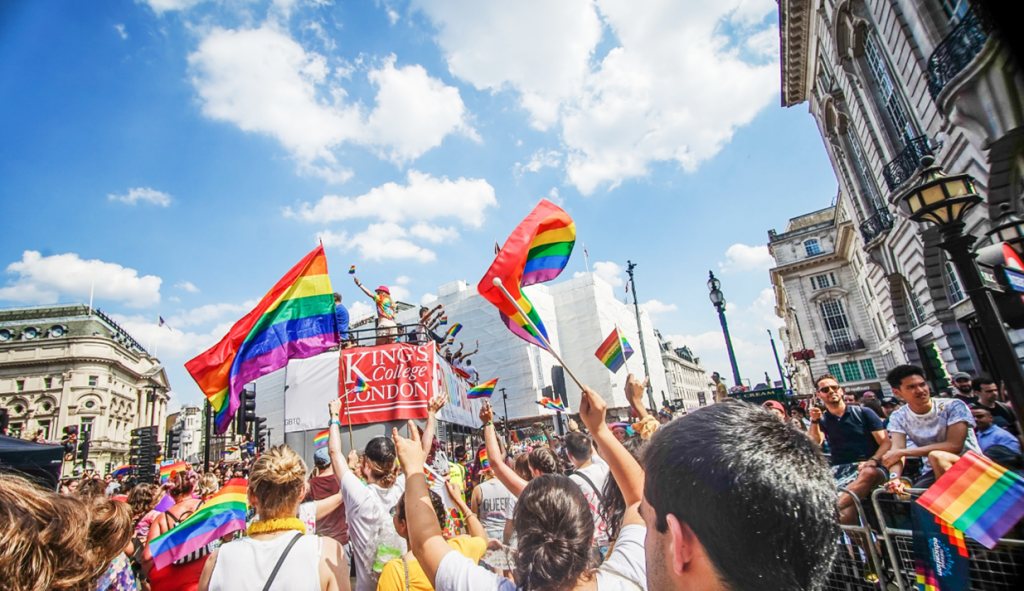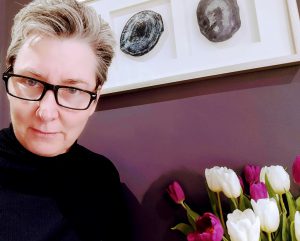It’s been a pretty fabulous summer here at King’s, with members of our university community celebrating all things LGBTQ+ for Pride Month throughout June & July. Jake Orros an Equality, Diversity & Inclusion Project Officer here at King’s shares some of the highlights of one very busy pride month for King’s.
In a snapshot Proudly King’s once again marched in the Pride in London parade and joined fellow London universities at the London Trans+ Pride march. Our faculties got involved with the celebrations, with the Faculty of Natural Mathematical & Engineering Sciences hosting an ‘LGBTQ+ in STEM’ event and Faculty of Dentistry, Oral and Craniofacial Science staff and students came together for a pride inspired picnic. Members of the EDI team volunteered behind the scenes at Pride in London, brushing shoulders with LGBTQ+ icons. And together with colleagues in student services and corporate communications, the EDI team brought you a ‘what pride means to me’ blog series.
Volunteering at Pride in London
Pride events across the world including London’s are only possible because of the amazing people who give up their time and volunteer to help run these events. Over 1000 volunteers supported Pride in London this year, including our very own Lorraine Kelly, Director of Organizational Development & Equality, Diversity & Inclusion, and myself. This year’s Pride in London theme was ‘Never March Alone: Championing Trans Allyship’.
Lorraine was part of the brilliant stages team, working behind the scenes to pull off a brilliant show on the Trafalgar Square stage. Lorraine brushed shoulders with stars including Beverly Knight, Adam Lambert, Rita Ora who all preformed on what is affectionately known behind the scenes as T Square.
In Lorraine’s own words – “I had the great pleasure of volunteering at pride at Trafalgar Square it was an amazing experience, the vibe was positive and inclusive – if you haven’t done it before I would def recommend that you get involved”.
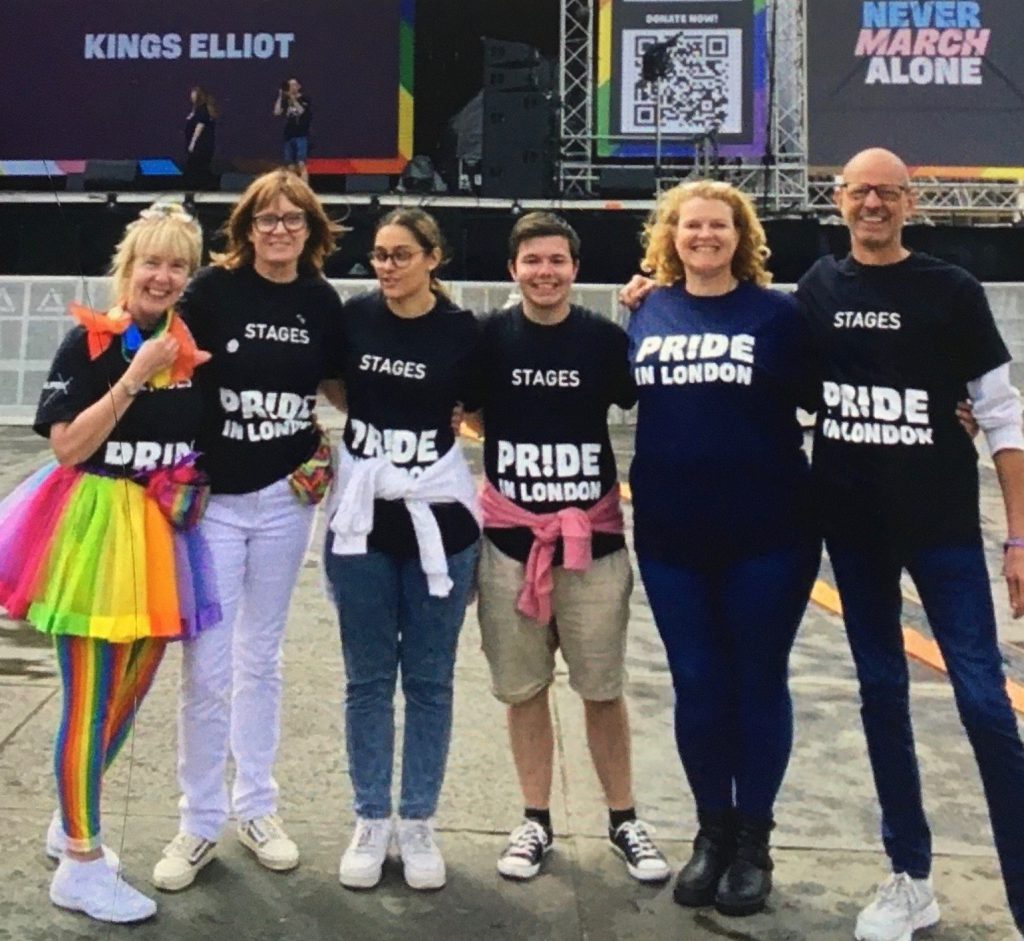
Lorraine (second from right) volunteering at the Trafalgar Square stage before opening to the public.
I was also there volunteering on the day, I had the brilliant job of being an Event Manager and being part of the core team planning and delivering the Pride Family & Youth Area at St Giles-in-the-Fields Church. We delivered the space in partnership with Lego and The Scouts who ran pride themed activities for young people and their families. We had our biggest attendance to the space ever with approximately 7,000 visitors throughout the day which was phenomenal and it was brilliant to see members of the King’s community drop in with their families too! I am so proud of what we achieved on the day, the 6 months of planning paid off and was so worth it – I loved seeing the beaming smiles of the young people and their families as they enjoyed the LGBTQ+ inspired activities from The Scouts & Lego and performances from LGBTQ+ artists on our stage.
I couldn’t agree with Lorraine more, volunteering at pride was a brilliant experience and it is such a great way to meet new people, to feel a part of something special and to have a real positive impact. So why not join the team and volunteer at a pride event next year!
What Pride Means to Me? Blog Series
Throughout pride month we shared what pride means to members of our King’s Community. Emily Coutts interviewed 5 brilliant staff and students from across King’s about why pride month is important to them. Emily spoke to: Taj – a Global Health & Social Medicine student, Jo – who Head of Mental Health & Counselling Outreach & Training, Rosanna – a Student Content Manager and James & Andrew – both Faculty Wellbeing Advisors.
We asked Emily to sum up her experience of working on this inspiring pride month project – “It was a pleasure to interview these fantastic people about what Pride means to them. Although their experiences and identities vary hugely, I was struck that they’re all motivated by a desire to make life better for other LGBTQ+ people, and to support those experiencing oppression. It’s great to know that I’m surrounded by such thoughtful and passionate colleagues at King’s.”
You can find the blogs on our Diversity Digest site here.
Proudly King’s
Kirsty McLaren, Communications & Community Co-Chair of Proudly King’s reflects on how our LGBTQ+ staff network marked pride month…
This year marked a transformative moment for Pride at King’s College London.
Amidst the standard festivities associated with Pride in London, King’s took steps to address some pressing challenges faced by queer students in higher education. For the first time ever, Proudly King’s marched shoulder to shoulder with Pride Power, a group of students on our flagship widening participation programme, K+.
Without support, reaching university is a challenge for anyone from a widening participation background. Thriving while you’re there is even harder. Some students face further barriers because of immutable parts of their identity. LGBTQ+ students experience more bullying, poorer mental health, and higher rates of estrangement. They are less likely to feel they belong at university. This leads to many LGBTQ+ students dropping out of university and those who stick it out until graduation often leave with a lower degree classification. The Widening Participation team created Pride Power to address these issues.
What makes Pride Power stand out is its tangible efforts in fostering an environment where these students find belonging. Its essence lies in its relentless efforts to create an environment of acceptance and love. Many of its members, for instance, haven’t come out at home. Yet, with Pride Power by their side, they confidently joined us at Pride in London. Thanks to generous donations from our Departments and Faculties, they had group T-Shirts and could express themselves with their own banners. Making the banners was a beautiful way for them to increase their bond, sharing their experiences of being queer in school and at home. One student described it as “the best experience of [their] entire life.”
As for Proudly King’s, we kicked off the Pride season with a pre-pride party hosted on campus. It was an authentic expression of our community, with speeches and craft tables to write messages of hope for the future generations. These were sent to the Pride Power students ahead of their march. The event marked our return to Pride in London in the spirit of pride as a protest: less about grand gestures and more about genuine connection, setting the stage for the subsequent march.
Our Pride Planning Committee’s relentless efforts and the generous donations culminated in a remarkable parade float on the morning of Pride in London. Both Proudly King’s and Pride Power’s branding was on full display, with a DJ truck that played Cher’s hits repeatedly, much to the crowd’s delight. Our Senior Sponsor the Rev’d Dr Ellen Clark-King showcased her unwavering allyship by joining us on the truck right after surgery. Also, among us was the KCLSU LGBTQ+ Network President, Taj Donville-Outerbridge, a double recipient at the 2023 Queer Student Awards.
“Joining [the march] and hearing from [the committee] and feeling like the weight of the world was taken off my shoulders – well that was SOMETHING” – Suz from the School of Politics and Economics on her first ever Pride parade.
7 days later, Proudly King’s marched once again in London Trans+ Pride, an event that is a response to the injustices that trans, intersex, gender nonconforming, and non-binary people face daily, all over the world. Though June is long-gone, our Pride season at King’s will stretch all the way through to September when we’ll be attending London Bi+ Pride. And in August we’ll be teaming up with the KCL Race Equality Network to attend UK Black Pride, the world’s largest celebration for African, Asian, Middle Eastern, Latin American and Caribbean-heritage LGBTQ+ people.
We’re looking forward to the next academic year when we can expand efforts to make King’s a better place for LGBTQ+ people. Our Proudly King’s committee is expanding, and our Pride Power group will grow even more. To see more pictures from Pride in London and Trans Pride, sign up to our mailing list, or even apply to become a committee member just visit www.proudlykings.com
Love, Always.
Kirsty on behalf of Proudly King
Pride Picnic
Our colleagues in the dentistry faculty hosted a pride picnic with over 50 staff and students attending. There were some incredibly tasty pride themed cakes, including a huge rainbow inspired sponge cake created by a talented member of FoDOCS staff.
The decorate your own gingerbread person activity base was buzzing with activity, with people queuing to decorate their own edible LGBTQ+ gingerbread icons. The event served as an important opportunity to further develop a sense of meaningful community within the faculty and enabled all those present to take time out from busy work and study schedules to learn more about LGBTQ+ inclusion and meet other members of the community & allies.
King’s Libraries – Must Watch List
Throughout the month staff from across King’s Libraries & Collections team shared their suggestions of must watch LGBTQ+ inspired content.
You can explore all of their suggestions on the King’s Libraries Twitter & Instagram pages, where you will find an eclectic mix of documentaries, short films and thought provoking features, all curated to expand your knowledge of queer history and theory.
All the suggested content is available to watch for staff and students via the Library’s Kanopy subscription here.
My experience at London Trans Pride
Alex an undergraduate Management and Modern Languages student and a summer intern with the Student Content Management team attended London Trans Pride.
You can read all about Alex’s experience of attending the event here.
Want to Learn more about Equality, Diversity & Inclusion at King’s College London?
- Found out more by visiting our Equality, Diversity & Inclusion at King’s pages.
- Follow us on Twitter.
- Email the team at diversity@kcl.ac.uk
